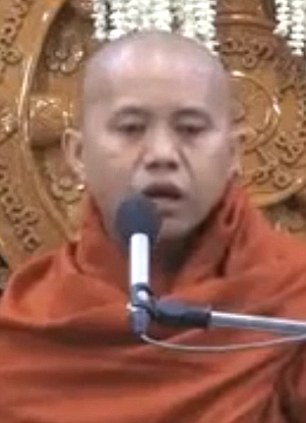Right-Wing Buddhist Leading the Campaign to Force Muslims out of Burma Says He Wants His Group ‘To Be Like the English Defence League’
Matt Blake, Daily Mail (London), May 31, 2013
The English Defence League might be the last place you would expect a devout Buddhist monk to turn for inspiration.
But a right-wing spiritual leader in Burma has revealed how he wants to copy the EDL in his bid to rid his country of its Muslim minority.
The Venerable Ashin Wirathu, who was jailed for nine years in 2003 for inciting anti-Muslim violence, says the hardline nationalist party should be applauded for ‘not carrying out violence, but protecting the public’.
His comments come a week after more than 1,000 EDL members marched on Downing Street in a protest over the killing of Drummer Lee Rigby in nearby Woolwich, swilling beer, chanting anti-Muslim slogans and clashing with anti-fascist activists. Thirteen people were arrested.
Now, orange-robed Wirathu, who leads Burma’s so-called ‘969’ campaign to boycott Islamic businesses and bring an end to inter-marriage with Buddhists, says he wants his gang members to be more like the EDL.
According to The Times, Wirathu said: ‘People give me various names: The Burmese bin Laden, the bald neo-Nazi.
‘[But] do you know the English Defence League? We would like to be like the EDL. Not carrying out violence, but protecting the public.’
The ‘969’ group was behind last month’s riots that saw intense clashes between its members and Muslims that left 43 people dead in the city of Meiktila.
And only yesterday, hundreds of Buddhist men on motorcycles waved iron rods in a northeastern town in Burma before setting fire to a Muslim-owned cinema in the latest incident to spill over from simmering religious tensions in the country.
The intimidating display in Lashio came a day after a mosque and a Muslim orphanage were torched after reports that a Muslim man set fire to a Buddhist woman.
Residents said a cinema was burned as the mob sped around the town as part of a new wave of violence targeting the religious minority.
Ashin Wirathu is a firmly anti-Islamic monk who was jailed in 2003 for inciting anti-Muslim violence, but was released last year as part of the broader amnesty for prisoners and admitted being at Meiktila, although insists he played no part in the violence.
‘We Buddhist Burmese are too soft,” he told the BBC in a recent interview. ‘We lack patriotic pride.
He urges Buddhists all over the country to boycott Muslim businesses and hands out stickers printed with the number ‘969’, which symbolise elements of Buddhism.
Wirathu accuses Muslim men of repeatedly raping Buddhist women, of using their wealth to lure Buddhist women into marriage, then imprisoning them in the home.
But it seems a fear of Muslim success is driving the discrimination.
‘They – the Muslims – are good at business, they control transport, construction. Now they are taking over our political parties. If this goes on, we will end up like Afghanistan or Indonesia,’ he said.
Burma is a mainly Buddhist country, but nine per cent of its 60 million people are Muslim.
However, there is an open resentment of Muslims, openly expressed and they are referred to with the derogatory term ‘kala.’
Last month, horrifying footage emerged of police officers standing by while Burmese Buddhist rioters belonging to the’969 squad’ set fire to a Muslim man watched him slowly die.
In the grainy footage posted on the internet a man – almost certainly a Muslim – is seen rolling around on the ground in agony after being set alight by an angry mob.
His body is charred, but he is clearly still alive and moves slowly as a crowd surrounds him. Several policeman can be seen looking on.
A voice can be heard calling for water, to which another voice replies ‘ No water for him. Let him die.’
The clip surfaced as Human Rights Watch published a report which concluded Burmese authorities and members of Arakanese groups have committed crimes against humanity in a campaign of ethnic cleansing Muslims.
The sectarian violence, the worst seen in Asia’s fledgling democracy since last year’s conflict, was sparked after an argument between a Muslim gold shop owner and his customers in the city of Meikhtila.
The unleashing of ethnic hatred, suppressed during 49 years of military rule that ended in March 2011, is challenging the reformist government of one of Asia’s most ethnically diverse countries.
Jailed dissidents have been released, a free election held and censorship lifted in Myanmar’s historic democratic transition.
But the government has faced mounting criticism over its failure to stop the bloodshed between Buddhists and Muslims.
Hundreds of Muslims fled their homes to shelter at a sports stadium, said local officials.
The unrest is a bloody reprise of last year’s violence in Rakhine State in western Myanmar, which officially killed 110 people and left 120,000 people homeless, most of them stateless Rohingya Muslims.
Locals complained there were too few police in this city of about 180,000 people to subdue the unrest.
















